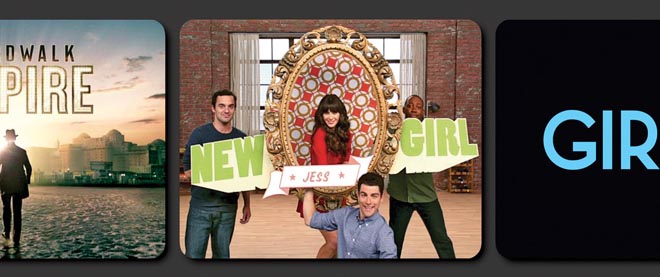TV title fight: short vs. long
Why Girls, Bates Motel and New Girl are going with minimal title sequences
Share
 The A&E drama Bates Motel, a TV prequel to Psycho, is giving fans a chance to create the opening title sequence—but with a catch: it has to be really short. “We’re looking for an awesome 15-second title sequence that captures the feel of Bates Motel,” series creator Carlton Cuse (Lost) said when announcing the contest, whose winner will be announced before the series premiere in March. Fifteen seconds is actually a pretty generous amount of time for a title sequence today. Many shows don’t have them at all: HBO’s most hyped recent show, Lena Dunham’s Girls, has nothing but a simple title card, like a low-budget movie. “In my view, short sequences are a missed opportunity,” says Danny Yount, who created the nearly two-minute opening for HBO’s Six Feet Under. But if Bates Motel is any indication, a title sequence may not be important enough to take a lot of time for, or even to hire professional designers for.
The A&E drama Bates Motel, a TV prequel to Psycho, is giving fans a chance to create the opening title sequence—but with a catch: it has to be really short. “We’re looking for an awesome 15-second title sequence that captures the feel of Bates Motel,” series creator Carlton Cuse (Lost) said when announcing the contest, whose winner will be announced before the series premiere in March. Fifteen seconds is actually a pretty generous amount of time for a title sequence today. Many shows don’t have them at all: HBO’s most hyped recent show, Lena Dunham’s Girls, has nothing but a simple title card, like a low-budget movie. “In my view, short sequences are a missed opportunity,” says Danny Yount, who created the nearly two-minute opening for HBO’s Six Feet Under. But if Bates Motel is any indication, a title sequence may not be important enough to take a lot of time for, or even to hire professional designers for.
A full-length title sequence is certainly expensive to do, especially for shows that don’t take the easy route and string together a bunch of old clips. Yount says his sequence for Six Feet Under, a mini-movie that summed up the themes of the show, required “a full crew, three locations and two days of shooting,” but adds that “the producers wanted something unique to television, so I think it was a worthwhile investment for them.”
The bigger issue with long titles is that they eat up screen time, and most shows don’t have much of that. A show like Cheers could afford a minute for its famous titles (with old pictures of bar patrons) because it had five minutes of ads, as opposed to nine minutes for a half-hour show today. And it’s not just time that networks are worried about: now that TV viewers have hundreds of choices, a long title sequence can give them an excuse to change the channel.
Most shows can’t just get rid of the main title, though, because that’s often what people remember about a TV program. On YouTube, most older shows are represented only by their introductory sequences, and fans use them as a basis for a lot of their own videos, such as a live-action recreation of the opening of The Simpsons that went viral. That’s why shows are increasingly trying the Bates Motel solution: have a very short opening that sums up the theme and style of the program with blinding speed.
Yount thinks this emphasis on brevity in title sequences is a let-down after the tiny epics HBO made to introduce its classic dramas. “I feel the length to build a story, or a film within a film, is better,” he says. And it’s not only the storytelling that’s impaired by short titles, but the ability of the composer to come up with really memorable theme music. “One of the best things about Six Feet Under is the wonderful music Thomas Newman created,” Yount recalls. “It would not be the same thing as a short jingle. It really transports you into this dream-like place and sets the moods perfectly.” From this point of view, if shows took a little more time for their opening credits, they might stand a better chance of coming up with theme songs that could become hits the way the Friends theme did in the ’90s.
Other title design appreciators, though, point out that a short sequence isn’t always an artistic compromise. “You can do more in 90 seconds than you can with 23, but it also depends on what might serve the show best,” says Ian Albinson, editor-in-chief of the website Art of the Title. He points to the Emmy-nominated sequence for the comedy New Girl, where what seems to be a full-length theme abruptly cuts off as the male characters lose interest and walk away. “Its impact comes from the fact that it is short and sweet,” says Art of the Title managing editor Lola Landekic. “Any longer and it’d be saccharine.”
Bates Motel may point the way to another advantage of the short main title: an interactive title is a cheap way to generate fan participation before a show even begins. Still, some recent dramas, like Boardwalk Empire, have stuck with the long and expensive format, and Yount, for one, hopes it never goes away completely: “The viewer should be made to believe that something very special is about to happen. You can’t do that by just rushing right into the show.”